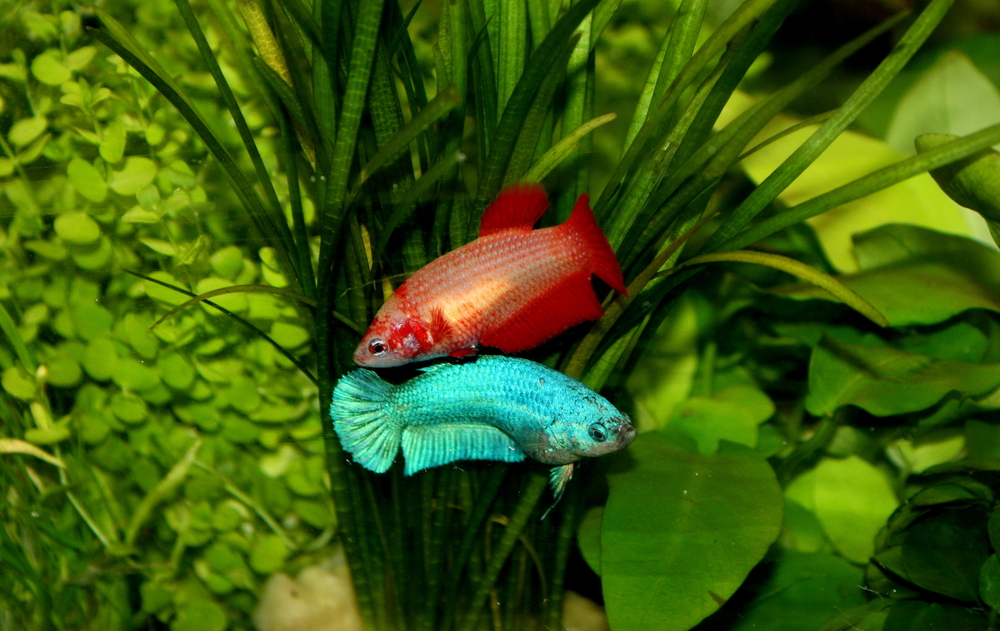Betta fish are among the most beautiful, vibrant, and dynamic fish you can introduce to your aquarium. Especially with the proper tank lighting, they bring an elegant touch of marine beauty to any room. But, alas, betta fish have lifespans like any other organism. They grow old and, sadly, eventually die. When they do, it’s time to lay the old fish to rest and introduce another to their new home.
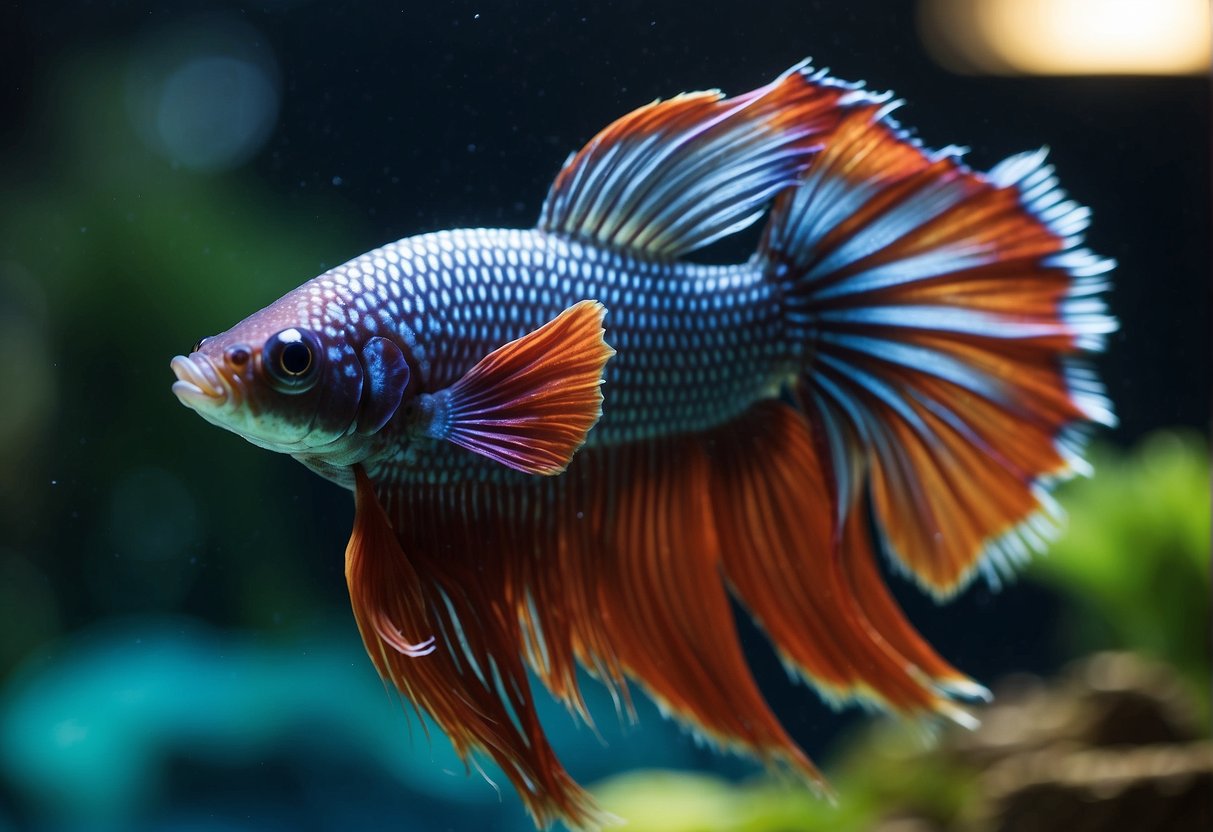
Dealing with the passing of your vibrant, finned little friend is sad, but alas, it’s the reality of keeping an aquarium. Thus, giving your betta the best care you can throughout its life is imperative. Doing so requires that you know all about its lifespan, including the factors that affect it, such as health, environment, and comfort.
Contents
Understanding Betta Fish Lifespan
Understanding betta fish’s lifespan within their natural environments and influential factors is the key to knowing how long your betta will live in your aquarium. For better or worse, living in an aquarium environment, which only mimics their natural habitat to some degree, impacts the average lifespan of betta.
In the Wild vs. Captivity
Betta fish inhabit a significantly different environment in the wild than in captivity. Wild bettas commonly live in rice paddies and slow-moving streams in Southeast Asia. This comes with all the regular aspects of living in nature, including predatorial threats (especially Angelfish and other larger fish), disease, and varying water conditions.
Due to all these factors, the average lifespan of betta fish is 2 to 4 years, and all fluctuations due to environmental pressure are duly considered.In captivity, it’s a significantly different story. Unlike Southeast Asian rice paddies, an aquarium is a curated and protected environment devoid of most of the natural hazards wild betta face.
Naturally, this makes aquarium betta tend to live longer, on average, than their wild counterparts. With ideal water management, proper lighting, a good diet, and healthcare, a betta fish in an aquarium may live anywhere from 3 to 5 years.
An important thing to remember is that, often, the age of a betta fish can be hard to determine if it did not attain maturity in captivity. Bettas typically reach maturity at three months old.
Their aging clock starts ticking from there, seeing them through growth for the next year and a few more years till the end of life. You must rely on the seller or vet’s estimate for betta fish captured from their natural habitat.
Essential Care for Betta Fish
It goes without saying that your betta fish requires adequate care and the right environment to live a relatively long, comfy life. With everything from aquarium conditions and choice of tankmates to nutrition relevant here, you’ve basically got your work cut out for you. Here are some recommendations to make the task much easier and more rewarding for you.
Tank Requirements
When picking an aquarium for your betta fish, you should ideally go for one that’s spacious enough for them to swim about freely. I’d recommend a volume no longer than 5 gallons for a single betta (perhaps an extra gallon or two, if you wish).
However, be careful not to fill the entire tank. Bettas have a labyrinth organ that allows them to breathe air from the surface, so you need to leave considerable space for them to access the water’s surface.
Water Quality and Temperature
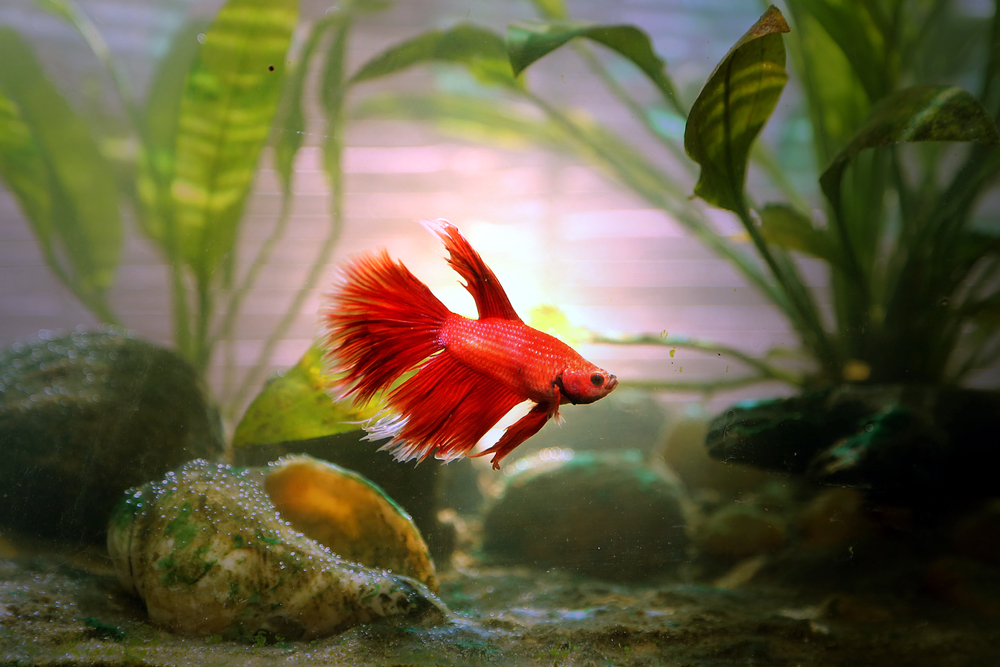
Water quality is an even more pertinent factor in ensuring the longevity of betta fish. If the water is not suitable, the betta’s life will be unpleasant and even shorter. So, what water quality metrics should you be mindful of?
First, you need to keep ammonia, nitrite, and nitrate levels within safe limits. The water temperature is vital, too; Betta fish prefer warm water between 76 to 81 degrees Fahrenheit. You need a reliable heater to maintain this range.
Finally, keep in mind the water acidity and alkalinity levels indicated by pH measurements. In essence, you need to keep the following parameters at the stated ranges:
- Ammonia: 0 ppm
- Nitrites: 0 ppm
- Nitrates: <20 ppm
- pH: 6.5–7.5
- Temperature: 76–81°F
Proper Nutrition
Good food in the right quantities and at the right frequency greatly increases your betta’s expected lifespan. Given their nature as carnivores, you want to ensure they eat a balanced, protein-centric diet.
They can and should eat various foods, such as brine shrimp, bloodworms, and specially formulated pellets. The popularly recommended frequency for feeding your betta is twice a day in small quantities to prevent overfeeding and maintain proper nutrition.
Health and Illness Prevention
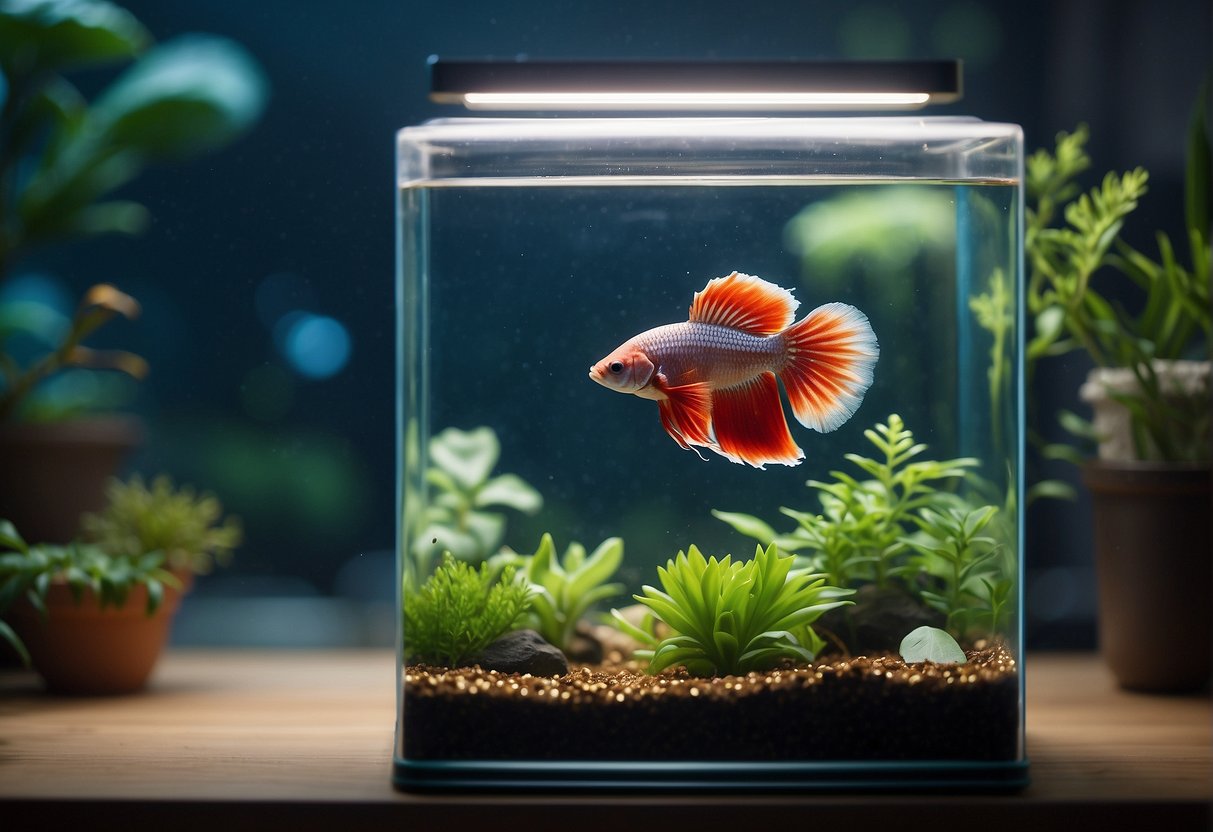
Health and illness are among the most prominent factors impacting the lifespan of betta fish, both in the wild and captivity. The healthier the betta, all other factors duly considered, the longer it tends to live.
As such, you must be very mindful of your betta’s health, which implies understanding common diseases, stress factors, and the importance of routine health checks.
Common Diseases in Bettas
Betta fish are prone to several diseases, the most common of which are fin rot and bacterial infections. The most common cause of fin rot is poor water conditions, which cause the fins and tail to fray and disintegrate. Bacterial infections, on the other hand, often manifest through symptoms such as lethargy, loss of appetite, and abnormal growth.
- Preventative measures include:
- Regular water changes to maintain ideal conditions
- Monitoring for early signs of disease
- Quarantining new fish before introducing them to the tank
Stress Factors and Avoidance
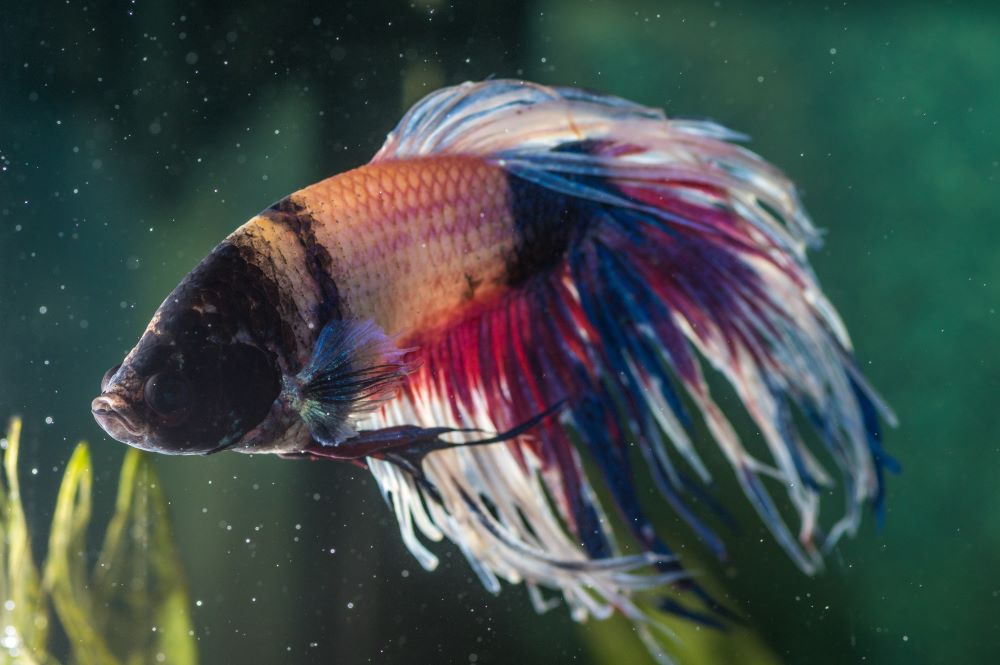
Aside from disease and infection, stress is the most significant other cause of ailment in healthy betta fish. If you notice that your fish is stressed, the problem might be poor water quality, overcrowding, and aggressive tank mates. To reduce stress, you need to do the following:
- Keep the water temperature constant between 76-81°F (24-27°C).
- Provide ample space and hiding places within the aquarium.
- Avoid housing bettas with known aggressive species.
Routine Health Checks
Most ailments your betta fish can suffer are easily treatable once identified. Still, some of these ailments may turn terminal if unnoticed and untreated. This is why conducting routine health checks for early detection of any onset of illness is crucial. These checks involve examining your betta for signs of illness like the following:
- Clamped fins
- Spots or discoloration
- Abnormal swimming patterns
You should call in a vet for the best and most comprehensive examination. Even if you don’t call one frequently, it’s advisable to do so at least once every two months.
Environmental Enrichment
Replicating a betta fish’s natural habitat is crucial to ensure they thrive and, potentially, live longer. Technically, the betta’s natural habitat is not exactly the safest or most pleasant, what with all the lurking diseases and ever-present danger of predation.
So, you don’t want to replicate everything. Still, betta fish are neurologically adapted to their natural habitat in many ways, so introducing some good elements into their new home provides comfort, health benefits, and a longer lifespan. Let’s discuss these elements.
Decorations and Plants
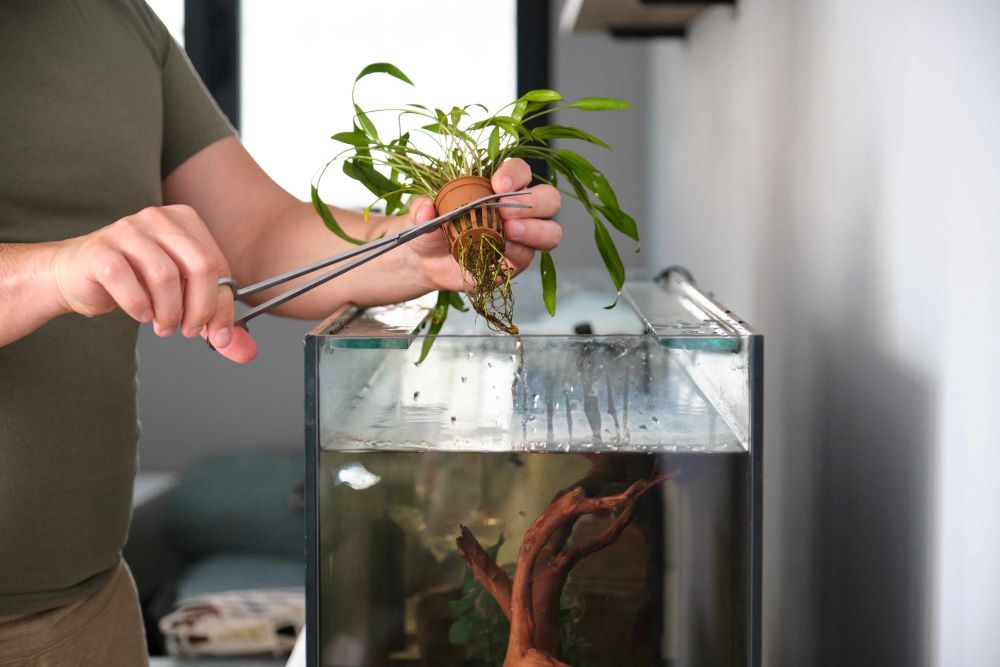
In the wild, betta fish are surrounded by plants. Some of those overshadow the waters in which the fish live, thus blocking out some light and allowing only a subdued amount into the water. The rest are underwater plants, which provide hiding and playing spots.
Speaking of hiding spots, there are usually rocks, pebbles, and small caves to hide in or explore. Your betta tank needs plants and rocks or pebbles to serve the same function. The ideal plants to use are anubias or java fern, both of which enhance the aesthetic of the aquarium. The stones should be smooth to prevent injury to the betta.
Companion and Tankmates
Betta fish are very selective about tankmates but are never alone in their natural environment. There are always other fish with whom they either get along nicely or fight it out. They tend not to get along well with other brightly colored, territorial, aggressive, fin-nipping, or even bigger fish. You want to keep all this in mind when finding a tankmate for your betta.
Corydoras are generally the best fish companions for them due to their non-aggressive nature and different swimming levels. For community tanks, you should introduce the female bettas with caution, watching for signs of stress or aggression.
You should always have a backup plan to separate the male and female betta if they are incompatible. Finally, whether you’re considering males or females, the number of tank mates should also be based on the tank size to avoid overcrowding.
Behavior and Social Interaction
Before we talk about betta fish’s specific behaviors and social tendencies, it’s important to understand that their actions are often rooted in their aggression and territorial nature. Let’s break down these behaviors to provide a clear understanding of their social interactions.
Identifying Betta Behaviors
Bettas display a variety of behaviors that clearly indicate their mood and social standing. Flaring their gills is a common sign of aggression or a display of dominance. The species is known to have long, flowing fins, which can be a visual cue used during these displays.
Aggression and Territoriality
The territorial nature of Bettas is well-documented, with males primarily known to guard their domain vigorously. To prevent fights, it’s advisable to house them alone or ensure ample space if kept with other fish.
Territorial behavior can escalate quickly; thus, monitoring interactions when introducing new tank mates is crucial. The same aggression that may serve them in the wild can cause problems in captivity, so you need to understand each Betta’s temperament and how to navigate it.
Breeding and Reproduction
Successfully breeding betta fish hinges on understanding their specific reproductive behaviors and providing an ideal environment for raising the offspring, known as fry.
Betta Breeding Basics
Male bettas are known for their elaborate courtship displays during mating time. They are pretty adept bubble nest builders who keep the females’ eggs in said nest.
However, before they move beyond that point, you should ensure you have selected the right pair—look for healthy males and females that exhibit vibrant colors. You should also provide the water parameters in the breeding tank to stay at the following levels.
- Water Temperature: Consistently maintain between 78°-80°F
- pH Level: Keep the pH around 7.0 for optimal conditions
- Tank Conditions: Ensure cleanliness to prevent fungal infections
Raising Fry Successfully
Once the fry hatch from their eggs as larvae, they are vulnerable and require careful attention. Initially, the larvae will feed off their yolk sacs, but within a few days, they start free-swimming and require food.
To sustain them during this critical growth phase, you provide insects, brine shrimp, or bloodworms. They must be fed multiple times a day in small quantities to avoid polluting the water.
Frequently Asked Questions
Let’s address some of the most common queries regarding the lifespan of betta fish that many enthusiasts often wonder about.
Does the lifespan of male betta fish differ from that of female betta fish?
The lifespan of a betta fish does not appear to depend on its sex, as betta fish live up to four years, whether male or female.
How can you tell the age of a betta fish?
There is no reliable way to tell how old a betta fish is. You can only gain some idea by looking at its physical features. However, a veterinarian will know better how to estimate.
Do betta fish lose color with age?
If your betta fish is losing color, it is probably due to aging, as betta tend to become paler the more they age.
How long can a betta fish live in a well-maintained aquarium?
In a well-maintained aquarium, betta fish typically live between 2 and 5 years, with the possibility of reaching up to 10 years under optimal conditions.
What can help betta fish live longer?
You can help your betta fish live longer by providing a good diet and favorable living conditions.

Ian Sterling, founder of Fishlab.com, began his aquarium journey over 30 years ago, driven by a deep fascination for fish and their diverse personalities. His website, Fishlab.com, is dedicated to making fishkeeping accessible and enjoyable, offering beginner-friendly guidance, expert insights, and a community for aquarists to connect and share experiences.


